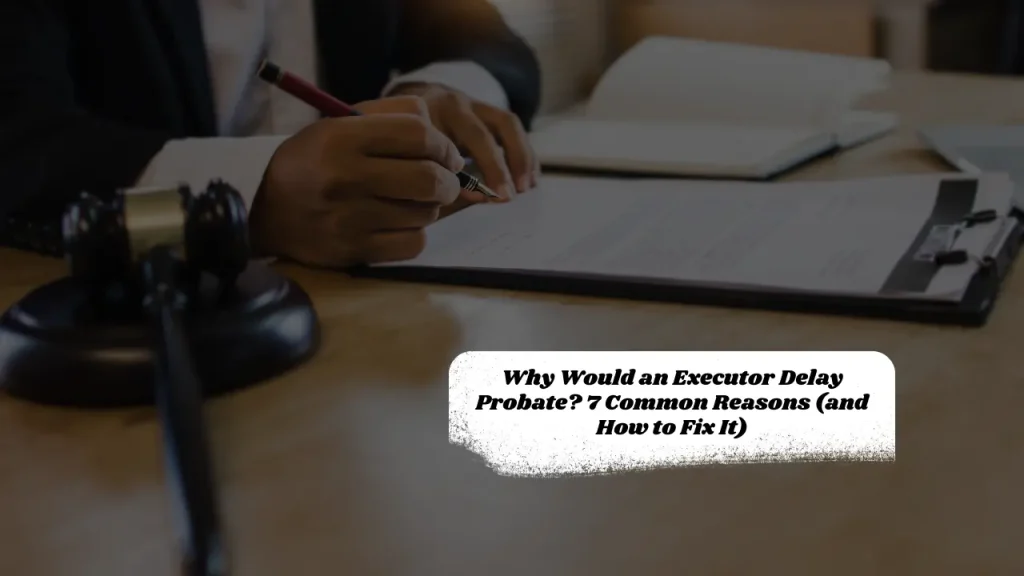Why Would an Executor Delay Probate? 7 Common Reasons (and How to Fix It)
You’ve been waiting months for your inheritance, but the executor hasn’t filed a single probate document. Frustrating, right? You’re not alone. According to the American Bar Association, 30% of probate cases face delays due to executor inaction. Let’s unpack why executors drag their feet—and what you can legally do about it.
Table of Contents
What Does an Executor Actually Do?
Before diving into delays, let’s clarify the executor’s role. An executor is legally responsible for:
- Filing the will with the probate court.
- Inventorying assets (e.g., property, bank accounts).
- Paying debts, taxes, and funeral costs.
- Distributing remaining assets to heirs.
But when executors stall, estates get stuck. Here’s why it happens—and how state laws intervene.
7 Reasons Executors Delay Probate (With Real Examples)
1. They’re Overwhelmed or Grieving
Scenario: A spouse in Ohio is named executor but can’t emotionally handle paperwork after their partner’s death.
Legal Reality: Ohio Revised Code § 2113.05 allows executors to resign, but the court must approve a replacement. Delays here often stretch 3–6 months.
2. The Will Is Contested
Scenario: A sibling in Florida disputes the will, claiming undue influence. The executor pauses probate to avoid liability.
Legal Reality: Florida Statutes § 733.109 lets heirs challenge wills within 90 days of notice. Until resolved, the estate freezes.
3. Missing or Complicated Assets
Example: An executor in Texas can’t locate a deed to a ranch, or the estate includes cryptocurrency.
State Law: Texas Estates Code § 256.153 requires executors to file a detailed inventory within 90 days. Missing assets trigger extensions.
4. Tax Snafus
Issue: The estate owes federal/state taxes, but the executor misses IRS deadlines (e.g., Form 706 for estates over $13.61 million in 2024).
Consequence: Penalties accrue, and probate stalls. California’s Franchise Tax Board can also place liens on property.
5. Executor Misconduct
Red Flags: An executor in New York uses estate funds for personal expenses or hides assets.
Solution: File a petition under New York SCPA § 711 to remove them. Courts prioritize these cases, but resolution takes 2–4 months.
6. Out-of-State Property
Hiccup: The deceased owned a vacation home in Arizona, requiring ancillary probate in that state.
Process: Ancillary probate in Arizona (ARS § 14-3201) adds 4–12 months, especially if local attorneys aren’t hired.
7. They’re Just Inexperienced
Example: A family friend in Pennsylvania named as executor doesn’t know they need a “surety bond” (per 20 Pa.C.S. § 3171) and misses deadlines.
Result: The court may appoint an administrator, but not before delays.
Related article for you:
What Does Undisposed Mean in Probate Court?

How Long Can an Executor Legally Delay Probate?
State laws set deadlines, but they’re often flexible:
- California: Executors have 30 days to file the will (Probate Code § 8200), but courts rarely penalize delays unless heirs complain.
- Texas: Estates must close within 4 years (Texas Estates Code § 362.005), but extensions are common.
- Florida: Probate should wrap in 12 months, but contested cases average 18–24 months (Florida Bar data).
Key Takeaway: Executors have wide latitude unless heirs take legal action.
What Can Heirs Do to Speed Things Up?
1. Send a Formal Demand Letter
Example: A polite but firm letter citing state deadlines (e.g., “Per Georgia Code § 53-7-60, you must file an inventory within 60 days”).
2. Petition the Court to Remove the Executor
Grounds for removal include:
- Fraud (e.g., selling assets under market value).
- Conflict of interest.
- Gross incompetence.
Cost:
500–2,000 in legal fees, depending on the state.
3. Request a Status Conference
Some courts, like those in Michigan, allow heirs to request updates via MCR 5.119.
4. Hire a Probate Attorney
A lawyer can pressure the executor via subpoenas or motions. In Illinois, attorneys often cite 755 ILCS 5/24-1 to force asset distribution.
Executor Delays: By the Numbers
- Avg. Probate Timeline: 12–18 months (National Center for State Courts).
- Top Delay States: California (18–24 months), New York (16–20 months).
- Common Culprits: 42% of delays stem from tax issues, 33% from family disputes (Probate Research Institute).
How to Prevent Executor Delays in Your Estate Plan
- Name a Co-Executor: Reduces burnout (e.g., a trusted relative + a bank).
- Include a “No-Contest” Clause: Deters heirs from disputing the will.
- Prepay Expenses: Set aside funds for probate costs (attorney fees, taxes).
- Simplify Assets: Consolidate accounts or use trusts to avoid probate.
The Nuclear Option: What If the Executor Dies or Disappears?
Rare but possible. Solutions include:
- California: Petition under Probate Code § 8522 to appoint a new executor.
- Texas: Use a “Muniment of Title” (Texas Estates Code § 257.001) to bypass probate if the will is uncontested.
Key Takeaways
- Executors delay probate due to grief, disputes, taxes, or incompetence.
- Heirs can legally intervene by petitioning the court or hiring an attorney.
- Proactive estate planning minimizes delays.
Resources for Heirs
- State Probate Guides:
FAQ: Executor Delays
Can I sue an executor for delaying probate?
Yes, if they’re negligent. Courts may order compensation for losses (e.g., depreciated property).
Can an executor go to jail for delaying probate?
Only if they commit fraud. Delays alone aren’t criminal.
Final Word
Executor delays are common but fixable. Whether you’re an heir stuck in limbo or planning your estate, knowledge is power. When in doubt, lean on probate codes—and a good attorney—to keep things moving.
About the Author

Sarah Klein, JD, is an experienced estate planning attorney who has helped clients with wills, trusts, powers of attorney, and probate matters. At All About Lawyer, she simplifies complex estate laws so families can protect their assets, plan ahead, and avoid legal headaches during life’s most sensitive moments.
Read more about Sarah
